General Ordinances - City of New Buffalo
General Ordinances - City of New Buffalo
General Ordinances - City of New Buffalo
Create successful ePaper yourself
Turn your PDF publications into a flip-book with our unique Google optimized e-Paper software.
CITY OF NEW BUFFALO<br />
CODE OF ORDINANCES<br />
I. The connection <strong>of</strong> the building sewer into the public sewer shall conform to the requirements <strong>of</strong> the building<br />
and plumbing code or other applicable rules and regulations <strong>of</strong> the <strong>City</strong>, or the procedures set forth in<br />
appropriate specifications <strong>of</strong> the A.S.T.M. and W.P.C.F. Manual <strong>of</strong> Practice No. 9. All such connections shall<br />
be made gas-tight and watertight. Any deviation from the prescribed procedures and materials must be<br />
approved by the District before installation.<br />
J. The applicant for the building sewer permit shall notify the District when the building sewer is ready for<br />
inspection and connection to the public sewer. The connection shall be made under the supervision <strong>of</strong> the<br />
Superintendent or his/her representative.<br />
K. All excavations for building sewer installation shall be adequately guarded with barricades and lights so as to<br />
protect the public from hazard. Streets, sidewalks, parkways, and other public property disturbed in the course<br />
<strong>of</strong> the work shall be restored in a manner satisfactory to the Superintendent.<br />
Section 16-12. Use <strong>of</strong> public sewers and rates and liens.<br />
A. No person shall discharge or cause to be discharged any storm water, surface water, ground water, ro<strong>of</strong> run<strong>of</strong>f,<br />
subsurface drainage, uncontaminated cooling water, or unpolluted industrial process waters into any sanitary<br />
sewer.<br />
B. Storm water and all other unpolluted drainage shall be discharged to such sewers as are specifically designated<br />
as combined sewers or storm sewers, or to a natural outlet approved by the appropriate state and county agency.<br />
Industrial cooling water or unpolluted process waters may be discharged, upon the approval <strong>of</strong> the appropriate<br />
state or county agency, to a storm sewer or natural outlet.<br />
C. Except as hereinafter provided by specific limits, no person shall discharge or cause to be discharged any <strong>of</strong> the<br />
following described waters or wastes to any public sewer:<br />
1. BOD in excess <strong>of</strong> three-hundred (300) milligrams per liter (mg/1).<br />
2. COD in excess <strong>of</strong> four-hundred fifty (450) mg/l.<br />
3. Chlorine demand in excess <strong>of</strong> fifteen (15) mg/l.<br />
4. Color, as from but not limited to dyes, inks, vegetable tanning solutions, shall be controlled to prevent light<br />
absorbency which would interfere with treatment plant processes or that prevent analytical determinations.<br />
5. Explosive liquid, solid, or gas, gasoline, benzene, naphtha, fuel oil, or other flammable liquid shall not be<br />
admitted.<br />
6. Garbage not properly shredded { greater than one-half (1/2) inch} shall not be allowed.<br />
7. Grease, oils, wax, fat, whether emulsified or not, in excess <strong>of</strong> fifty (50) mg/1, or other substances which<br />
may solidify or become viscous at temperatures between thirty-two (32) degrees Fahrenheit, and onehundred<br />
fifty (150) degrees Fahrenheit shall not be admitted to the sanitary sewer.<br />
8. Industrial wastes in concentrations above limitations set forth by appropriate state agencies to comply with<br />
federal guidelines for protection <strong>of</strong> treatment plant and receiving water course shall not be allowed to enter<br />
sanitary sewers in sufficient quantity to impair the operation <strong>of</strong> the sewage treatment processes.<br />
9. Inert suspended solids (such as but not limited to Fullers earth, lime slurry, and lime residues) or <strong>of</strong><br />
dissolved solids (such as but not limited to sodium chloride and sodium sulfate) in unusual concentrations<br />
shall not be allowed.<br />
Chapter 16- SEWERS AND SEWAGE DISPOSAL 16-8



